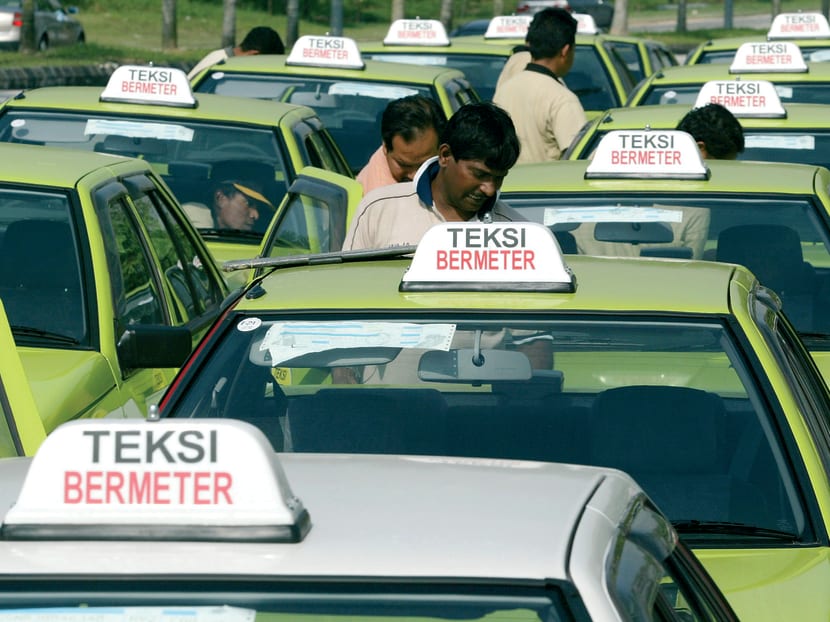Malaysian cab fares set to rise by up to 40%: Report
PETALING JAYA — Taxi fares across Malaysia are expected to increase by up to 40 per cent with the Land Public Transport Commission (SPAD) scheduled to announce the new fare structure this week, said industry sources to Malay Mail.
PETALING JAYA — Taxi fares across Malaysia are expected to increase by up to 40 per cent with the Land Public Transport Commission (SPAD) scheduled to announce the new fare structure this week, said industry sources to Malay Mail.
According to the sources, the new rates for metered taxis will see an increase for the flag-down fares, distances and time charges.
“After months of rigorous discussions with stakeholders, the government has agreed to set a new rate for distance and time charge with a 40 per cent increase than the current fares,” the insider said.
The proposed new rates for metered taxi in Klang Valley, Penang, Johor Baru would be: Flag-down fare — RM3.30 (S$1.24) for budget cabs; Flag-down fare — RM4.00 for Teksi 1 Malaysia (TEKS1M); Flag-down fare — RM4.30 for budget cab in Penang; 25 sen for every 200m (40 per cent increase); 25 sen for every 30 seconds (40 per cent increase)
The current flag-down rates for budget taxis are RM3 for Klang Valley and Johor Baru and RM4 for Penang while the rates for TEKS1M is presently RM3.
The current distance charge and time charge are 87 sen per km and 10 sen per 21 seconds respectively. The new rates will, however, see consumers paying RM1.25 per km.
At a glance, the overall new fares may translate to a significant hike due to heavy traffic and longer routes which contribute to longer travelling time.
A passenger may bite the bullet sitting in a budget cab for one km over an hour in a horrendous gridlock in the city as the meter would clock RM1.25 per km and RM30 per hour.
However, an industry observer said the new fare is designed to encourage cabbies to go into the city instead of circling suburban areas.
“Taxi drivers can no longer come up with excuses of refusing to drive to certain locations due to heavy traffic,” said the observer, who was involved with the consultation process on the fare hike with SPAD since 2013.
“After much deliberation and public consultation since July 2013 to set a new fare structure for taxis in Peninsular Malaysia especially for metered taxis in Penang, Johor Baru and Klang Valley, SPAD will finally announce it this month,” the observer said.
A source from the Prime Minister’s Department said SPAD wanted to announce the new fares last October but was instructed by the government to put it on hold until end of last year.
“It was already approved middle of last year but the government was waiting for the right time to make the announcement.
“The floods in the east coast and northern states over the end of December also delayed the plan. SPAD wanted to announce it by the end of January but it was not the right moment in view of the fuel price reduction since New Year’s day,” the source said.
He said the new fare structure was the result of in-depth discussion in a series of taxi workshops nationwide since July 2013, by taking into account the high operation costs and cost of living since the last taxi fare review in 2009.
“SPAD took into consideration that for the past six years, the cost of living has gone up by around 2.5 per cent each year.
“Cabbies have had to curb high costs such as escalating maintenance cost between 20 per cent to 25 per cent, fuel expenses by 17 per cent, battery by 30 per cent to 35 per cent and tyres by 25 per cent to 30 per cent,” the source said.
The new fare structure will also involve taxi service for car rental companies or ‘kereta sewa’ in the Peninsular as it was also included during SPAD’s public engagement in 2013 to finalise the new structure with the objective to elevate the taxi industry nationwide.
However, it remains to be seen what type of service improvement and new fare rates that SPAD would announce for the ‘kereta sewa’ service in other states.
It is understood that SPAD may provide a grace period of up to six weeks for taxi drivers and companies to synchronise or calibrate the meters.
It is also understood that after the new taxi fare rates are implemented, SPAD is also working on a solution as among the first step of control for taxis.
The system known as the Centralised Taxi Service System (CTSS) or tracking system will be installed for metered cabs in stages and the system will be able to record movements of taxis and capture data by meters.
At present, CTSS is only fitted into close to 900 TEKS1M vehicles in Klang Valley and Johor Baru. MALAY MAIL ONLINE







